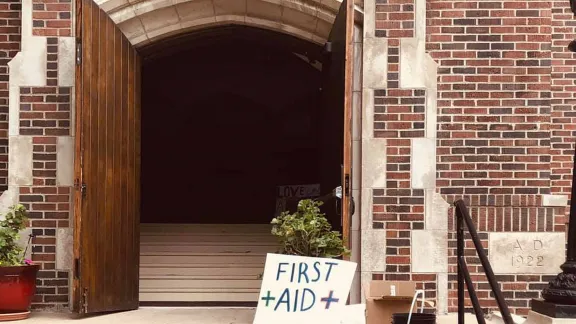
The doors of Holy Trinity in Minneapolis remained opened 24-hours supplying first aid to protestors and food to the community. Photo: Holy Trinity Lutheran Church/D. Rojas Martinez
“Mama, I can’t breathe”
It is Ordinary Season, and in Minnesota the sun shines late into Compline as we live in a haze of sweaty clothes, sun-kissed skin, and explosive rumbling storms.
Four weeks ago, George Floyd was murdered by police in Minneapolis. On the following day, as brimming storm clouds descended over Minneapolis, my neighborhood caught fire. Righteous anger ignited people into the streets, as centuries of oppression erupted.
One week prior to the uprising, I began working at Holy Trinity Lutheran Church in the Longfellow neighborhood of South Minneapolis, Minnesota, USA as a deacon with the lofty title of Community Engagement and Education Coordinator.
In the early morning hours following the first night of revolutionary actions, I found myself in a daze of broken glass and smoke as I walked the short distance from my apartment to the church building. The sound of helicopters was constant, and I knew that my city was ashes of glowing embers ready to re-ignite.
In this new morning, ashes coated anything falsely shiny. Dripping water from fire extinguishers drowned false narratives. As I walked on the sacred ground of the Lakota native people, now called Minnesota, I had no prayers left. And so, I challenged the Divine to end up with a scratchy throat and burning eyes and to shout into the void until SHe was hoarse and yelling into an indifferent world, “MAMA! I CAN’T BREATHE!”
Once at church, I spent daylight hours prepping the building alongside strangers. We all knew a second night of uprising would mean our doors needed to open once again as a medic station. All day inside the ancient building without electricity, sweat dripped as we tried our best to organize a generous flood of donations.
When evening arrived, I sat outside to catch my breath and welcomed a gentle-yet-strong breeze. The seemingly peaceful eventide deceived me however, as dusk settled in the frightening noises of helicopters and popping began, again. Smells of fear – pepper spray - that stung eyes and throats wafted around us, and I stood on the edge of our property unable to do anything but observe and bear witness. The light, which was bright, was quickly darkened in smoke.
People dazedly ran towards our doors in hope that we could offer help, it is then that I realized there were no classes in seminary to teach me how to pour milk on the eyes and mouths of tear-gassed teens.
Underneath a tree, I saw a man my age, who on any other occasion would have appeared to me as not easily shaken, he was broken and crying. All I could do was kneel beside him and repeat, “You’re alive. You’re breathing. I’m here with you.”
I write all of this to share with you from my air-conditioned office. Today, my office is a space that although mostly bare, no longer has boarded up windows, and beautiful rays of sun seep in. I am no longer working 24-hour days, and our church community is no longer in survival mode.
Over the last few weeks, Holy Trinity Lutheran Church learned how to streamline our emergency ministry offering basic supplies to offset the burned out stores in our neighborhood. But, I am beginning to wane away from what now seems to be a lifetime ago because I am once again falling prey to the status quo.
Due to my particularities of being a Mexican immigrant in-and-out-and-in-between-status in the U.S., plenty of people in my circles have told me that I am not called or perhaps not yet. Plenty others have told me I am called - for such a time as this. I, myself, doubt. At Lauds, when I make the sign of the cross and before the day gets going in all of its rush, I usually believe that I am called, to this place.
My immigration status in the US is a big mess I am attempting to wash away like well-meaning folks who washed away the street art made by demonstrators. In my rush for normalcy, I know assuredly that our African-American siblings have endured centuries of oppression in this country and that I cannot allow myself to be lulled back into inaction – normalcy. We cannot allow these modern-day lynchings, the terrorizing of black bodies to continue.
If we say we are not racist, we deceive ourselves and the truth is not in us. But if we confess our sin, God is faithful and just. We must confess. We must repent. There is much to do.
Deacon David Rojas Martìnez is a deacon of the Lutheran Diaconal Association and Community Engagement and Education Coordinator at Holy Trinity Lutheran Church an Evangelical Lutheran Church in America (ELCA) congregation.


